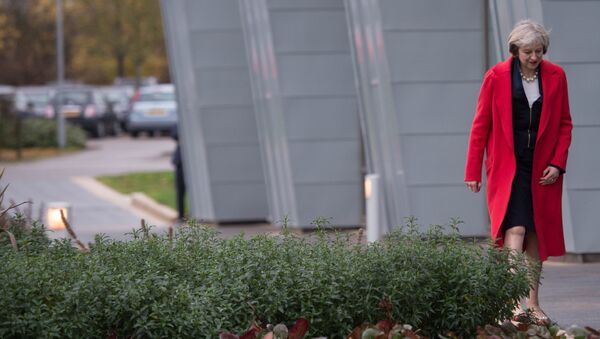After repeated calls from the business community and other political figures to pursue a transitional deal to soften the impact of Brexit, May told a Confederation of British Industry (CBI) event on Monday, November 21, that she understood concerns about potentially falling off a "cliff edge" should the UK and EU fail finalize a trade deal within two years of triggering Article 50.
"Obviously, as we look at the negotiation we want to get the arrangement that is going to work best for the UK and the arrangement that is going to work best for business in the UK. And I'm conscious that there will be issues that will need to be looked at," she said.
#May causes £ to rally strongly as she signals softer stance on #Brexit at #CBI conference with chance for transitional deal for businesses
— Foenix Partners (@FoenixPartners) November 22, 2016
"People don't want a cliff edge, they want to know with some certainty how things are going to go forward."
May's ambiguous comments about exploring what is going to "work best" for the UK, along with repeated refusals from government spokespeople to rule out an interim deal, has led many to speculate that the government may be considering trying to strike a temporary agreement to avoid falling into WTO trade rules.
However, there has been a backlash in Europe following May's rhetoric, with Manfred Weber, leader of the European People's Party (EPP) in the European Parliament and an ally of German Chancellor Angela Merkel, saying any potential transitional deal would see the UK abide by the EU's four freedoms.
Govt sources say May's 'cliff edge' comment was not an intentional hint at a transitional Brexit deal
— Laura Kuenssberg (@bbclaurak) November 21, 2016
"The four fundamental freedoms are not negotiable for us," Weber told the Guardian newspaper.
"We will not move a millimeter from this position. This is the reason why the British prime minister has now changed her stance and is backtracking. She will have to explain to the British people why she cannot keep her promises. There can only be a good agreement between the EU and the UK if Europe's basic rules are accepted."
Pressure at Home, Pressure in Europe
The sheer complexity of the Brexit process and debate over what approach the UK will take has led to numerous political headaches for May, with the prime minister under pressure from all sides of domestic and European politics.
Pro-EU politicians and business figures have increasingly called for a transitional deal that would maintain access to the European single market, arguing that the delicate task of extracting Britain from the EU will take far longer than two years.
Interesting speculation that post 2019 UK May still have to accept free movement as part of a decades long transitional trade deal…
— ןǝɹɔuoɾ (@joncrel) October 23, 2016
While many argue this approach would be safer and more beneficial from an economic point of view, other pro-Brexit MPs have kept the pressure on the government to push ahead with its plans to trigger Article 50 by May next year, and subsequently leave the bloc by the spring of 2019.
Many EU figures have also taken a hard line against London, saying that the UK should either respect the EU's four freedoms, or look to pursue a "hard Brexit" outside the single market.
Leave Mean Leave hit out against May comment on transitional deal: “A transitional deal will fuel more uncertainty & leave Britain in limbo"
— Ian Dunt (@IanDunt) November 21, 2016
Judging by the rhetoric of European political figures, there is a concern that an interim deal would see the UK abide by EU freedom of movement rules, which would appear to break the prime minister's pledge to control immigration once leaving the bloc and anger many Brexiteers within her own party.
There are also concerns that a potential transitional deal would delay the UK's official exit from the union, with the possibility that British MEPs might still stand in the 2019 European parliament elections, subsequently blowing apart May's Brexit timeline.


